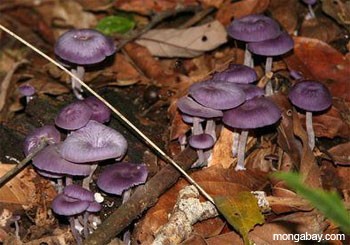Mushroom Extract May Help Fight Infection, Cancer
Mushroom Extract May Help Fight Infection, Cancer
American Association of Naturopathic Physicians (AANP)
August 9, 2006
Can the extract of a mushroom that is commonly found in the woods of North America, Asia and Europe have a beneficial impact on the human immune system? A small study using “Turkey Tail” mushroom (Trametes versicolor) extract, has found that it may.
The “Turkey Tail” mushroom is too tough to eat, but it may be ingested in the form of liquid or powdered extracts. One such extract produced by Kureha, Inc., Tokyo, Japan, is Polysaccharide Krestin® (PSK), a protein-bound polysaccharide fraction. The PSK extract has been found to have a beneficial effect in the treatment of certain types of cancers, especially when used in conjunction with chemotherapy. In order to determine its effects on the human immune system, a team of researchers sought to use a proteomic approach to identify the immunologically relevant proteins stimulated by treatment with the mushroom extract in human immune cells.
A New Study
The authors of the study “Cross Validation of Influence of Polysaccharide Krestinâ (PSK) Extract of Trametes versicolor on Protein Expression in Human Primary Peripheral Blood Lymphocytes” are John S. Finnell, M.S., Daesong Yim, Ph.D., Masa Sasagawa, N.D., and Cynthia A. Wenner, Ph.D., all from the School of Natural Health Sciences, Bastyr University, Kenmore, WA; Animesh Nandi , Ph.D., Prem Gurnani, and Kevin P. Rosenblatt, M.D., Ph.D., from the Department of Pathology, University of Texas Southwestern Medical Center, Dallas, TX.
 RELATED ARTICLE Secrets of hallucinogenic mushrooms uncovered by scientists Using unusually rigorous scientific conditions and measures, Johns Hopkins researchers have shown that the active agent in “sacred mushrooms” can induce mystical/spiritual experiences descriptively identical to spontaneous ones people have reported for centuries. The resulting experiences apparently prompt positive changes in behavior and attitude that last several months, at least. |
This study was funded in part by a grant from the National Institutes of Health – National Center for Complementary and Alternative Medicine (NCCAM), as well as an Institutional Seed Grant from Bastyr University.
The team will present preliminary findings during the 21st Annual Meeting of the American Association of Naturopathic Physicians (http://www.Naturopathic.org), being held August 9-12, 2006, at the Oregon Convention Center, Portland, OR.
Methodology
Immune cells were isolated from blood taken from nine healthy human volunteers and were cultured in vitro. The immune cell samples were treated under three different conditions: one set with no treatment, which served as the negative control; another set treated with the PSK mushroom extract; a third set treated with phytohemagluttin (PHA), a mitogen known to stimulate activation of immune cells; and a final set treated with both the mitogen and mushroom extract, in combination. Separate portions of cell lysates and supernatants (the liquid medium in which the cells were cultured) were collected at 0, 1 and 24 hours, flash-frozen, and stored at —80°C. Samples were analyzed at pH3 on immobilized metal affinity capture (IMAC30) ProteinChip® arrays, using both low-performance and high-performance mass spectrometry (MS). Statistical analyses of low- and high-resolution MS data were cross-validated to determine whether changes in immunologically relevant proteins occurred that were attributable to treatment with the mushroom extract.
Results
Statistical analysis of the spectra showed significant differential post-translational modification or expression of proteins, in the range of 1-30 kilodalton (kDa — a unit of measure of the atomic mass of the proteins), in the treated sets of cell cultures, as compared to untreated, negative control samples. Many immunologically relevant proteins, including many known to regulate immune responses, fall within the 1-30 kDa range.
Conclusions
The findings from this research study suggest that protein-bound, polysaccharide-rich fractions of Trametes versicolor PSK may modulate the post-translational modification or expression of proteins in healthy human immune cells. The next step is to extract and sequence the proteins of interest to determine their specific function in immune cells. The results invite further research to determine how selected extracts of medicinal mushrooms may be effective in strengthening the body’s immune system against diseases, such as cancer.
The American Association of Naturopathic Physicians (AANP) was founded in 1985 to provide alternative methods for healing human diseases and disorders than have been traditionally offered in the United States. Members of the AANP must have graduated from one of North America’s six accredited graduate schools of naturopathic medicine.
For more information about naturopathic physicians, log on to
http://www.naturopathic.org/.
This is a modified news release from the American Association of Naturopathic Physicians (AANP).